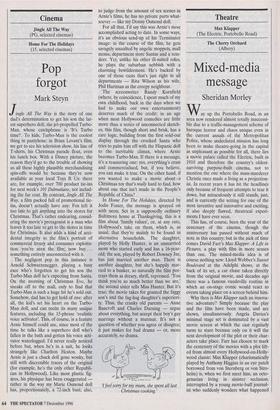Cinema
Jingle All The Way (PG, selected cinemas)
Home For The Holidays (15, selected cinemas)
Pop forgot
Mark Steyn
Jingle All The Way is the story of one dad's determination to get his son the lat- est superhero doll, the jet-propelled Turbo- Man, whose catchphrase is 'It's Turbo time!'. To kids, Turbo-Man is the coolest thing in pantyhose: in Brian Levant's film, we get to see his television show, his line of T-shirts, his Christmas parade float, even his lunch box. With a Disney picture, the reason they'd go to the trouble of showing us all these highly plausible merchandising spin-offs would be because they're now available at your local Toys R Us: there are, for example, over 700 product tie-ins for next week's 101 Dalmatians, not includ- ing the fur coat. By contrast, Jingle All The Way, a film packed full of promotional tie- ins, doesn't actually have any: Fox left it too late to get anything into the stores for Christmas. That's rather endearing, consid- ering the movie's protagonist is a man who leaves it too late to get to the stores in time for Christmas. It also adds a kind of acci- dental integrity to the film's portrait of commercial frenzy and consumer exploita- tion: you've seen the film; now buy ... something entirely unconnected with it.
The negligent pop in this instance is Arnold Schwarzenegger, playing a busy exec who's forgotten to get his son the Turbo-Man doll he's expecting from Santa. On the morning of Christmas Eve, he sneaks off to the mall, only to find that Turbo-Man is such a huge hit he's sold out. Somehow, dad has to get hold of one: after all, the kid's set his heart on the Turbo- Man doll, and can recite its many unique features, including the 15-phrase 'realistic voice activator'. This, of course, is a feature Arnie himself could use, since most of the time he talks like a superhero doll who's fallen in the bath and gotten his voice acti- vator waterlogged. I'd never really noticed before but, when he's in a suit, he looks strangely like Charlton Heston. Maybe Arnie is just a chuck doll gone wonky, but still with discernible traces of the original (for example, he's the only other Republi- can in Hollywood). Like most plastic fig- ures, his physique has been exaggerated — rather in the way my Marie Osmond doll has, proportionately, a 72-inch bust; also, to judge from the amount of sex scenes in Arnie's films, he has no private parts what- soever — like my Donny Osmond doll.
For all that, I'd say this was Arnie's most accomplished acting to date. In some ways, it's an obvious send-up of his Terminator image: in the course of the film, he gets savagely assaulted by angelic moppets, mall moms, department store Santas and a rein- deer. Yet, unlike his other ill-suited roles, he plays the suburban nebbish with a charming bewilderment. He's backed by one of those casts that's just right in all departments — Rita Wilson as his wife, Phil Hartman as the creepy neighbour.
The screenwriter Randy Kornfield (where, by coincidence, I spent much of my own childhood, back in the days when we had to make our own entertainment) deserves much of the credit: in an age when most Hollywood comedies are little more than a series of unconnected sketch- es, this film, though short and brisk, has a rare logic, building from the first sold-out display through the crooked Santa who tries to palm him off with the Hispanic doll to the inevitable climax, where Arnie becomes Turbo-Man. If there is a message, it's a reassuring one: yes, everything's crass and commercialised, but, if you believe, you can make it true. On the other hand, if you wanted to make a movie about • a Christmas toy that's really hard to find, how about one that isn't made in the People's Republic of China?
In Home For The Holidays, directed by Jodie Foster, the message is sprayed on with neon. Set in a supposedly ordinary Baltimore home at Thanksgiving, this is a film about 'family values', or, at any rate, Hollywood's take on them, which is, as usual, that they're mainly to be found in alternative households. The daughter, played by Holly Hunter, is an unmarried mom who started early and has a 16-year- old; the son, played by Robert Downey Jnr, has just married another man. There is another daughter, but she's happily mar- ried to a banker, so naturally the film por- trays them as dreary, shrill, repressed. 'You think you're so much better than we are,' the second sister tells Miss Hunter. But it's true; the movie takes for granted the faggy son's and the fag-hag daughter's superiori- ty. Thus, the cranky old parents — Anne Bancroft and Charles Durning — argue about everything, but accept their boy's gay marriage without a murmur. It's not a question of whether you agree or disagree; it just makes for bad drama — or, more accurately, no drama.
feel sony for my mum, she spent all last Christmas cooking.'


















































































 Previous page
Previous page